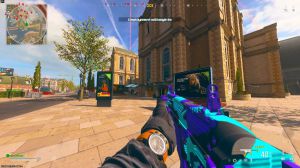News - Rx 7900 Xtx Easily Beats The Rtx 4080 Warzone 2. But Why Is This
What is happening in mw2 and wz2 that is making the 7900 xtx have such high frame rates?

Here we have the RX 7900. XTX here at Tech Yes, the city finally has it for benchmarking and review. However, before I get into the full-fledged review, I wanted to check out two games in particular, namely Call of Duty: Modern Warfare 2 and Call of Duty: War Zone 2. Before I did this article and before I did my testing, I noticed a lot of other reviewers were posting massive gains on the 7900.
XTX in particular compared to the Nvidia counterparts, especially the counterparts of a similar price point, take for instance the RTX 4080, where the 7900 XTX actually outperforms it by quite a big margin, however, when we compare that to other titles, the RTX 4080 is coming with similar performance to the 7900.
XTX, and so this got me thinking, "Why exactly is this?" And some of you may be wondering this exact same question, and to answer this question, we have to go all the way back to 2005, when Call of Duty was first designed, and it used an engine from a studio called Infinity Ward; however, this engine wasn't known to the public until.
In 2009, at an event called E3, IGN interviewed the developers, and they talked about the IW 4.0 engine. This engine was designed exclusively for the Call of Duty series, but the latest iteration of this engine, the IW 9.0, does spell good news for AMD Radeon gamers. However, why exactly is this?
Let's get into the details. You want to get yourself a cheap, legit copy of Windows activated right now. Today's article sponsor, SCD Keys, has you covered for as little as $14. When you use that coupon code bftyc, you can get Windows activated right now. Listen to the description below, and welcome back to Tech.
Why does the iw engine favor amd radeon cards?

Yes, city, and First up here, we're going to show you a side-by-side comparison of the 7900, the XTX, and the RTX 4090 in Modern Warfare 2. Now this is done in the multiplayer in the shipyard, which is a six-versus-six multiplayer called "Battle," and it's actually quite enjoyable, and you can get into the action very quickly.
But one thing I noticed about this particular benchmark was that the 7900 XTX was coming very close to not the RTX 4080 but the RTX 4090, and in fact, it was within 10 percent of the performance while still maintaining good one percent and 0.1 percent lows. However, when we scale it down to 1440p as well as 1080p, the 7900 XTX does perform even better at these lower resolutions.

Now, the first question you may be asking yourself is, "Why does the 7900 XTX perform so well versus its Nvidia counterparts?" The second question you may have is, "Is this an indication of what's to come in the future with the 7900 XTX?" Is it going to get these big performance gains like we've seen in the Call of Duty series versus its Nvidia counterparts with other games that are going to be released on PC?
Tackle the first question: It isn't just the RX 7900. XTX performs well in this title; in fact, if we go back to the 6800. XT is beating out the RTX 3080 by quite a significant margin too, so this then leads us to believe that this game engine is favorable to AMD Radeon graphics versus Nvidia graphics.
Now, this can go back to the way the textures are optimized, and in fact. Call of Duty has been known to have hit-or-miss style optimizations when it comes to its texture packs, and a very particular example of this was Call of Duty: Black Ops 2 versus Call of Duty: Ghosts. I preferred the former Call of Duty: Black Ops 2, where the playable experience was excellent and it was a smooth experience, but when I moved over to Call of Duty, things got different.

It didn't matter if I had the highest-end system; the game was simply stuttering all the time. It was actually a big mess, especially when it came to the multiplayer experience. And then I looked deeper into why exactly this was, and Black Ops 2 used a blending mixture on the textures to blend two tones together to reduce the demand put on the graphics cards themselves.
However, moving over to Call of Duty Ghosts, there was a major change here where they were using real-time HDR lighting effects and removed this blending fixture, which then resulted in heavier loads on the GPU and was the main cause of the stuttering in this game. So ultimately, whether a GPU performs well or not doesn't just come down to the drivers or the GPU.
Hardware itself: a lot of it falls to the game developers and the way they've implemented the engine in their game. So now that we've fast-forwarded to 2022. Modern Warfare 2 and War Zone 2 share the same engine, and they're both using the Infinity Ward 9.0 implementation, and this engine in itself does favor the AMD counterpart cards.
This was actually based on the same engine that was used in 2019 for the original Call of Duty: War Zone. So, in other words, if you have an AMD graphics card, you are going to get better value for money in terms of rasterization performance than the Nvidia counterparts. Now moving into the second question, is this an indicator of things to come for the 7900?
Does this mean the rx 7900 xtx is going to get massive gains over the rtx 4080 in a lot of other titles going forward?

XTX can You expect massive gains in other games going forward. The answer to that question is going to be yes and no, and the yes part of that question relates back now to the Call of Duty franchise, where the developers have stated that they're all going to be using this same new engine going forward.
forward, which means that AMD graphics cards will perform better than their Nvidia counterparts, especially at similar price points. Going, forward So in a nutshell, if you play Call of Duty and that's the only title you play on PC, then you are going to extract a lot of value from an AMD graphics card versus an Nvidia graphics card.

However, going back to the part where we said that going forward, this is the only engine in the land of PC gaming developers, we can even take an engine and make a completely different thing from another game that's used the same engine, whereas it's up to developers to make their own versions of things like physics textures and also lighting, and these effects come down ultimately to the game developer, and in the end, is that going to favor Nvidia or AMD?
So on the flip side of the equation, there will be games that, just like Call of Duty favors AMD Radeon graphics, there'll be games that favor in-game graphics. Their GTX and RTX graphics cards versus the AMD counterparts, however, are impressive to see that the 7900, or XTX, for instance in Modern Warfare 2 or when we benchmarked War Zone 2, was beating out the RTX 4080 comfortably and actually coming closer to that of the RTX 4090.

















